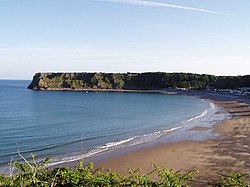Lydstep Haven: Difference between revisions
Created page with "{{Infobox town |county=Pembroke |LG district=Pembrokeshire |constituency=Carmarthen West and South Pembrokeshire |post town=Tenby |postcode=SA70 |latitude=51.650556 |longitude..." |
m →top: clean up, replaced: medieval → mediæval |
||
| Line 14: | Line 14: | ||
It is a notable private holiday resort and has a beach which can be reached from Manorbier.<ref name="DaltonStone2008">{{cite book|last1=Dalton|first1=Nick|last2=Stone|first2=Deborah|title=Frommer's Wales With Your Family: From Cliff-top Castles to Sandy Coves|url=https://books.google.com/books?id=evah8S5hyt8C&pg=PA131|accessdate=23 April 2011|date=30 December 2008|publisher=Frommer's|isbn=978-0-470-72320-3|page=131}}</ref> In ancient times the Kings of Dyfed and several Welsh saints have been connected with "Lis Castell"; [[Penally Abbey]] was located nearby. | It is a notable private holiday resort and has a beach which can be reached from Manorbier.<ref name="DaltonStone2008">{{cite book|last1=Dalton|first1=Nick|last2=Stone|first2=Deborah|title=Frommer's Wales With Your Family: From Cliff-top Castles to Sandy Coves|url=https://books.google.com/books?id=evah8S5hyt8C&pg=PA131|accessdate=23 April 2011|date=30 December 2008|publisher=Frommer's|isbn=978-0-470-72320-3|page=131}}</ref> In ancient times the Kings of Dyfed and several Welsh saints have been connected with "Lis Castell"; [[Penally Abbey]] was located nearby. | ||
The Lydstep hamlet contains the Grade-I listed ruins of a "[[Lydstep Palace|Bishop's Palace]]" across from the road from the Lydstep Arms. Although called a palace, it is understood to have been the hunting seat of Lord St David in the early 14th century. [[Cadw]] describe it as a | The Lydstep hamlet contains the Grade-I listed ruins of a "[[Lydstep Palace|Bishop's Palace]]" across from the road from the Lydstep Arms. Although called a palace, it is understood to have been the hunting seat of Lord St David in the early 14th century. [[Cadw]] describe it as a mediæval house containing a first-floor hall and possible parlour, and vaulted undercroft in two unequal sections, constructed of limestone masonry with slate roof. Traditionally known as the 'Place of Arms', its name perhaps became mutated to 'palace' and was probably where the manorial court of Manorbier and Penally was held.<ref>{{cite web|url = http://www.britishlistedbuildings.co.uk/wa-5991-lydstep-palace-manorbier|title= Lydstep Palace, Manorbier|publisher= British Listed Buildings|accessdate = 1 January 2014}}</ref> | ||
==References== | ==References== | ||
Latest revision as of 10:54, 30 January 2021
| Lydstep Haven | |
| Pembrokeshire | |
|---|---|
 Lydstep Haven | |
| Location | |
| Location: | 51°39’2"N, 4°46’2"W |
| Data | |
| Post town: | Tenby |
| Postcode: | SA70 |
| Local Government | |
| Council: | Pembrokeshire |
| Parliamentary constituency: |
Carmarthen West and South Pembrokeshire |
Lydstep Haven is a village and beach holiday resort in Pembrokeshire, known in ancient times as Lis Castell. The hamlet of Lydstep is separate from Lydstep Haven, lying just to the west of the beach and caravan park resort, but the area is generally known as Lydstep Haven. It lies along the A4139 road, west by road from Tenby and Penally and west of Manorbier.
It is a notable private holiday resort and has a beach which can be reached from Manorbier.[1] In ancient times the Kings of Dyfed and several Welsh saints have been connected with "Lis Castell"; Penally Abbey was located nearby.
The Lydstep hamlet contains the Grade-I listed ruins of a "Bishop's Palace" across from the road from the Lydstep Arms. Although called a palace, it is understood to have been the hunting seat of Lord St David in the early 14th century. Cadw describe it as a mediæval house containing a first-floor hall and possible parlour, and vaulted undercroft in two unequal sections, constructed of limestone masonry with slate roof. Traditionally known as the 'Place of Arms', its name perhaps became mutated to 'palace' and was probably where the manorial court of Manorbier and Penally was held.[2]
References
- ↑ Dalton, Nick; Stone, Deborah (30 December 2008). Frommer's Wales With Your Family: From Cliff-top Castles to Sandy Coves. Frommer's. p. 131. ISBN 978-0-470-72320-3. https://books.google.com/books?id=evah8S5hyt8C&pg=PA131. Retrieved 23 April 2011.
- ↑ "Lydstep Palace, Manorbier". British Listed Buildings. http://www.britishlistedbuildings.co.uk/wa-5991-lydstep-palace-manorbier. Retrieved 1 January 2014.
Outside links
| ("Wikimedia Commons" has material about Lydstep Haven) |